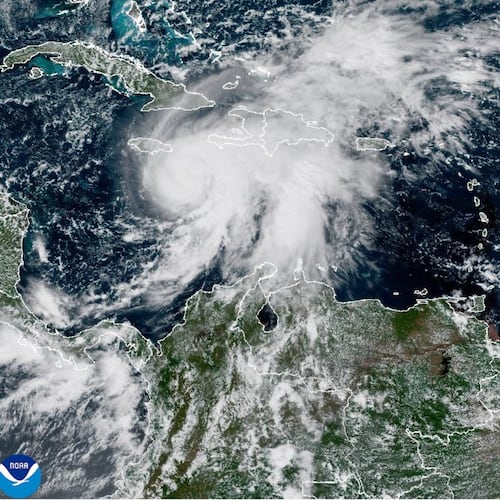It’s official, but not surprising, experts say: 2024 was the hottest year globally since record keeping began in 1850 and the second warmest for Georgia, too, federal agencies announced Friday.
For Earth, it’s the second straight year of record-setting average temperatures.
The findings from the National Aeronautics and Space Administration and the National Oceanic and Atmospheric Administration were expected ― the first eight months of 2024 all featured record or record-tying global average temperatures.
The lingering effects of unusually warm waters in the Pacific Ocean, a phenomenon known as El Niño, helped push temperatures up last year, NASA and NOAA scientists said. But most of all, the record heat is a symptom of global warming, which scientists say is mostly due to greenhouse gas emissions and is likely to continue unabated if humans keep burning fossil fuels.
“Global mean temperature will continue to rise as long as we continue to emit carbon dioxide,” said Gavin Schmidt, the director of NASA’s Goddard Institute for Space Studies. “And that’s something that brings us no joy to tell people, but unfortunately, that’s the case.”
The U.S. agencies reported global average temperatures were 2.63 degrees Fahrenheit, or 1.46 degrees Celsius, above the preindustrial average. Other outfits, including Copernicus, which monitors the climate for the European Union, also found 2024 was the hottest year on record, but their analysis showed the planet exceeded the critical 1.5 degree Celsius warming threshold for the calendar year.
That’s important because under the Paris Agreement, the international climate accord signed by 195 parties and countries — including the U.S. and the European Union — nations have pledged to keep global warming below that critical level.
Russell Vose, chief of NOAA’s National Centers for Environmental Information, agreed that by looking at an average of federal data and other datasets, it’s possible Earth was above the 1.5 degree Celsius marker in 2024. Still, he stressed that does not mean the globe has breached the Paris Agreement level — he said that would require sustained temperatures beyond a single year.
“You cannot expect a clean answer for when we will have passed a level like 1.5 (degrees Celsius) or 2 or anything,” Schmidt added.
Georgia’s 2024 was 1.7 degrees Fahrenheit warmer than the 30-year average. That’s in keeping with the upward trend observed in recent decades, said Pam Knox, an agricultural climatologist at the University of Georgia.
Other notable temperature records occurred in 2024:
- The contiguous U.S. endured its hottest year in 130 years of record-keeping, with average temperatures of 55.5 degrees. That’s 3.5 degrees above the 20th-century average, NOAA said.
- It was the hottest year ever recorded for the world’s oceans, too. Upper ocean heat content — an index that measures the amount of heat in the top 6,500 feet of the ocean — was at a record high in 2024, NOAA said. The five highest annual ocean heat values have all come in the last five years.
Ocean heat is a key ingredient for fueling powerful hurricanes, and the Atlantic Ocean whipped up an above normal number of tropical storms in 2024, some of which caused massive devastation in Georgia.
The Atlantic Basin produced 18 named tropical cyclones and the U.S. was hit by 27 separate disasters last year that caused losses of $1 billion or more.
The most costly was Hurricane Helene, which slammed Florida, Georgia, the Carolinas and East Tennessee in late September. According to NOAA, the storm caused 219 deaths and almost $80 billion in damages, making it the seventh-most-costly Atlantic hurricane on record.
Many Georgians are likely facing a yearslong rebuild from the storm’s destruction, but may soon begin receiving more federal money to help their recovery, after Congress passed and President Joe Biden signed a stopgap spending bill last month that includes $100 billion in disaster relief.
Biden, who leaves office on Jan. 20, made fighting climate change a signature of his presidency, and rejoined the Paris Agreement after the U.S. exited the pact under President Donald Trump. Trump has vowed to take the U.S. out of the Paris Agreement once again after he returns to the White House later this month and has said he will dismantle other climate initiatives and increase domestic oil production.
A note of disclosure
This coverage is supported by a partnership with Green South Foundation and Journalism Funding Partners. You can learn more and support our climate reporting by donating at ajc.com/donate/climate.
About the Author
Keep Reading
The Latest
Featured




